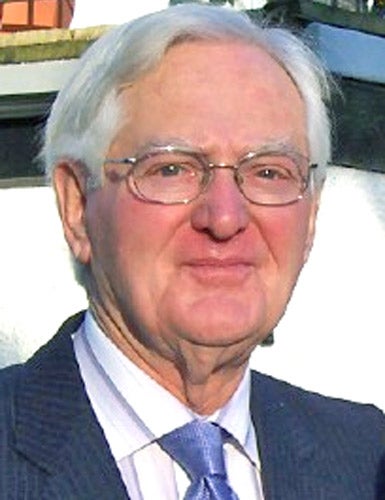Dennis Rees: Publisher and pioneer of the Welsh record industry

Dennis Rees played a major role in the recording of Welsh popular music and the publishing of Welsh books at a crucial point in their histories – the 1960s, when political pressure was being brought to bear on local and central government by Cymdeithas yr Iaith Gymraeg (Welsh language society) and Plaid Cymru. As the call for devolved governance gathered pace, there was a blossoming in the country's cultural life which urgently required new forms of expression. The vinyl record joined the book and periodical as a medium for young Welsh-speakers impatient with the bearded orthodoxies of their elders and they found a sympathetic ally in Dennis Rees.
At the time, Rees was employed by Alun Talfan Davies QC as managing director of Llyfrau'r Dryw ("Wren books"), publisher of the influential monthly magazine Barn ("Opinion") and a plethora of books in the Welsh language on which the health of the country's literature largely relied. He was also in charge of Recordiau'r Dryw ("Wren records"), the company's other arm. For this reason, Rees was jocularly known as "Den the Wren", a sobriquet in which he delighted in his usual genial manner. A former cinema manager and employee of the Rank Organisation, he was an astute businessman but had cultural interests of his own that were now given full rein.
He also understood the niceties of the publishing industry, and the even more complex processes of publishing books in the Welsh language, though I always had the impression his heart was really in the production of vinyl records for the popular market. He excelled in spotting and encouraging young musicians and bringing them to the company's recording studios in Alexandra Road, Swansea.
Always well turned out, he cut a trim, wholesome figure in the company of the trendy, not to say hippy musicians whom he was keen to record for the Dryw label. Although old enough to be the father of most of them, he was always respected, and liked, for his open mind and willingness to keep abreast of the new. If some of the youngsters thought they knew all about making records because they had read the NME, he would take them aside and put them right in his quiet way.
Undoubtedly the most important singer to be discovered by Rees was my near-namesake Meic Stevens. Not the easiest artiste to have to deal with, Stevens nevertheless gave the company some of his best performances. Among the songs Stevens recorded were "Câ* Walter" (Walter's song), "Mwg" (Smoke) and "Yr Eryr a'r Golomen" (The eagle and the dove), and they remain among the all-time classics of Welsh popular music, beloved of audiences of all ages. Original copies of his LP Gwymon (Seaweed) are known to have changed hands for hundreds of pounds.
Among other singers who signed up to the Dryw label were Endaf Emlyn, Y Diliau and Hogia'r Wyddfa. With Stevens came Heather Jones and Geraint Jarman and so Rees began to build up a catalogue that represented the best of the Welsh pop scene between 1962 and 1972. Rees also recorded live performances of the comedy duo Ryan and Ronnie which are some of the funniest acts ever staged in Welsh. One of his marketing ploys was to hire Swansea's Brangwyn Hall to promote his company's records in front of invited audiences who then undertook to buy the records as they appeared.
But by the mid-1970s a new record company had arrived on the Welsh pop scene, namely Sain, run by the singers and language activists Dafydd Iwan and Huw Jones (recently appointed Chairman of S4C). For a while Recordiau'r Dryw struggled to bring out spoken-word records about the history and literature of Wales, but soon afterwards gave up its Swansea studios. Sain bought its catalogue and has dominated the industry ever since.
Rees went back to being a publisher of books and periodicals, including my magazine Poetry Wales. I dealt with him in my capacity as the Welsh Arts Council's literature director, always finding him jovial, straight-forward and willing to consider publishing books, with subsidy, that might not otherwise have come his way. He also played a prominent part in the affairs of Côr Meibion Dyfnant, the Dunvant Male Choir, and served as chairman of Dunvant Rugby Club. He was very much a man for whom the local was the real and his delight in the triumphs of both choir and club knew no bounds.
Meic Stephens
Dennis Charles Rees, publisher and promoter of Welsh pop music: born Llanelli, Carmarthenshire 25 January 1927; married 1952 Madge Lodwig (two daughters); died Swansea 9 July 2011.
Join our commenting forum
Join thought-provoking conversations, follow other Independent readers and see their replies
Comments
Bookmark popover
Removed from bookmarks